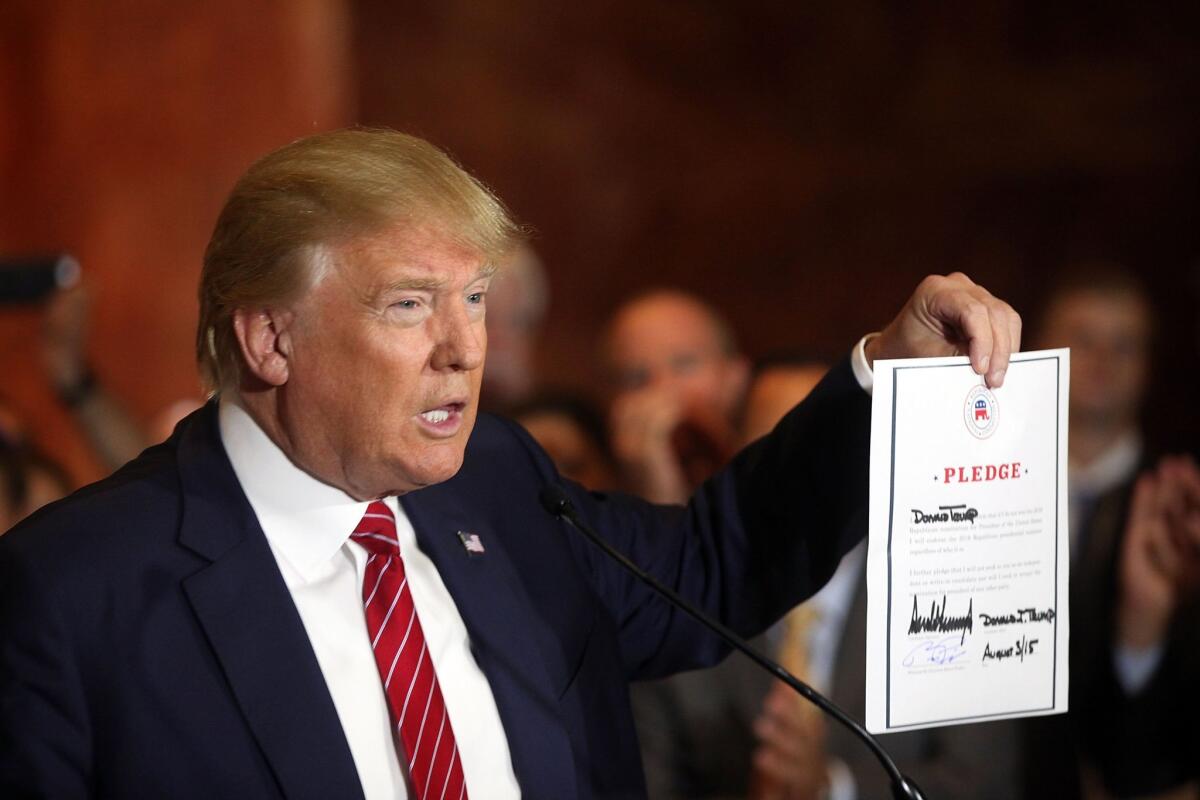Nominating Donald Trump will end the Republican Party as we know it. So will not nominating him

GOP presidential front-runner Donald Trump holds up a pledge to support the Republican nominee in the 2016 general election, ruling out a third-party or independent run, in New York City on Sept. 3, 2015.
- Share via
Nominating Donald Trump will wreck the Republican Party as we know it. Not nominating Trump will wreck the Republican Party as we know it. The sooner everyone recognizes this fact, the better.
Denial has been Trump’s greatest ally. Republicans and commentators didn’t believe he would run. They didn’t believe he could be an attractive candidate to rational people, no matter how angry with “the establishment” voters said they were. They – which includes me – were wrong.
The denial lasted longer for some than others. Long after many observers had come to the realization that Trump was the front-runner, Jeb Bush’s super PAC, Right to Rise, believed Bush’s real rival was Sen. Marco Rubio. It spent $35 million trying to destroy Rubio before it dropped its first $25,000 attacking Trump.
Over the weekend Republican National Committee Chairman Reince Priebus showed the first public signs of acceptance about what’s in store for the party. He finally acknowledged that the Republican nominee was probably going to be determined on the convention floor in Cleveland.
Priebus explained, rightly, that the rules are the rules, and that if Trump can’t secure the required 1,237 delegates before Cleveland, it’s anyone’s game. “This is a delegate-driven process,” he told CNN’s Dana Bash. Priebus added, “The minority of delegates doesn’t rule for the majority.”
Trump’s response to this floor-fight talk was to vomit up the usual word salad.
“All I can say is this, I don’t know what’s going to happen,” Trump told ABC’s “This Week.” “But I will say this, you’re going to have a lot of very unhappy people [if I’m denied the nomination]. And I think, frankly, for the Republicans to disenfranchise all those people because if that happens, they’re not voting and the Republicans lose.”
Trump represents just the most pronounced of a spider web of ideological and demographic fault lines [within the GOP] that are increasingly difficult to paper over.
Even through the syntactical fog, Trump’s point is clear: If he can’t reach 1,237, he should get the nomination anyway. Because he is Trump. If that doesn’t happen, his supporters will stay home, defect from the party, riot or all three.
And he’s right. Not about deserving the nomination even if he doesn’t have the delegates. That’s typical Trumpian whining. But he’s right that if he’s denied the nomination, many – not all, but many – of his supporters will bolt from the convention and the party.
Left out of Trump’s unsubtle threat: Many anti-Trump Republicans will desert the convention and the party if he’s not denied the nomination.
There are only three possible ways to avoid a calamitous walkout. Sen. Ted Cruz can win the nomination outright before the convention. That’s very unlikely given that he’d need to win roughly 80% of all the remaining delegates.
Second, Trump could reveal he has a hidden reservoir of magnanimity and patriotism, and rally his faithful to the consensus nominee. Stop laughing.
Third, the delegates could pick someone sufficiently attractive that Trump followers get over their understandable bitterness and support that candidate despite Trump’s objections. Who would that be? Certainly not Mitt Romney. Maybe a reanimated Ronald Reagan. Or Batman? I have no idea.
All of these scenarios are so unlikely in part because the split in the GOP isn’t merely about a single personality. Trump represents just the most pronounced of a spiderweb of ideological and demographic fault lines that are increasingly difficult to paper over. As Joel Kotkin put it in a column for the Orange County Register, the Republican Party now “consists of interest groups that so broadly dislike each other that they share little common ground.”
Put simply, and with the incessant and obtuse comparisons of Trump to Reagan notwithstanding, you cannot have a party that’s both Reaganite and Trumpish.
Trump’s cheerleaders insist that he’s a symptom of long simmering maladies on the right. I’m persuaded (even though I think Dr. Trump’s remedies are nothing but snake oil). Even now too many GOP leaders think Trump’s success is purely a result of his brash personality, and nothing more. But only when we accept that a terrible diagnosis is real is it possible to think intelligently about our options.
To wit: This ends in tears no matter what. Get over it and pick a side.
jgoldberg@latimescolumnists.com
Follow the Opinion section on Twitter @latimesopinion and Facebook
MORE FROM OPINION
The secret to saner elections? Stronger state parties
What happens when Donald Trump runs out of campaign cash? We’re about to find out
Religious Americans of all stripes should join the rabbis who protested against Trump at AIPAC
More to Read
A cure for the common opinion
Get thought-provoking perspectives with our weekly newsletter.
You may occasionally receive promotional content from the Los Angeles Times.










